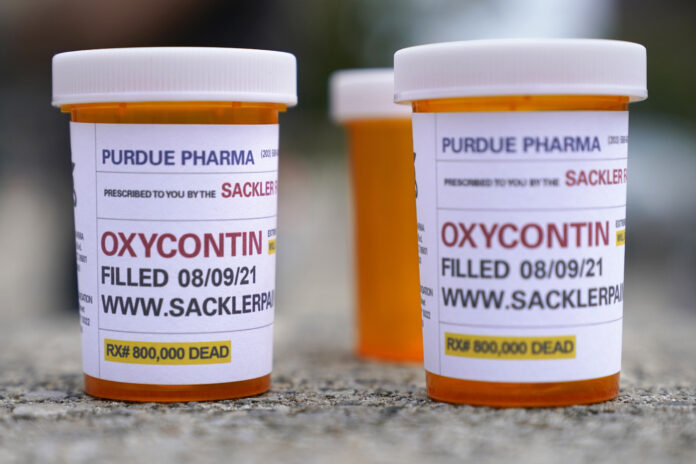
PROVIDENCE – Opioid maker Purdue Pharma LP and the Sackler family members who own the company settled with nine state attorneys general for their role in fueling the nation’s opioid crisis, R.I. Attorney General Peter F. Neronha announced on Thursday.
Rhode Island will receive approximately $45 million from the settlement, Neronha said, more than doubling the state’s recovery of approximately $20 million from the company’s initial bankruptcy plan. All funds will be used to support opioid treatment and prevention. As part of the agreement, the Sackler family will issue a statement of regret for its role in the opioid epidemic and allow institutions to remove the Sackler name from buildings and scholarships.
“As I have said before, there is no amount of money that will be enough to undo or compensate Rhode Islanders for the harms perpetrated by Purdue and the Sacklers,” Neronha said in a statement.
The settlement keeps intact provisions of the Purdue bankruptcy plan, forcing the company to be dissolved or sold by 2024 and banning the Sacklers from the opioid business, according to a news release from the AG’s office. The initial bankruptcy plan also required Purdue and the Sacklers to make public more than 30 million documents, and the settlement forces disclosure of additional records previously withheld as privileged legal advice.
Settlement highlights include:
- The Sackler family must pay at least $5.5 billion, with the potential for up to $6 billion.
- The new deal brings an additional $1 billion more than the initial bankruptcy plan, as well as $175 million that was previously conditioned on certain approvals but that now must be paid on the effective date.
- The new deal further provides for up to an additional $500 million from the sale of certain international assets in the event those assets are sold for an amount above a specified benchmark.
- Payments will be spread over 18 years, the same period of time as the settlement reached with the three largest pharmaceutical distributors, with larger payments frontloaded so that the states will receive more money sooner, as compared to the previous bankruptcy plan.
- The Sackler family will issue a statement expressing its regret for its role in the opioid epidemic and for the grief and loss it brought to the victims and families whose lives have been devastated.
- The Sackler family must allow institutions to remove the family name from buildings, scholarships and fellowships.
- Purdue must make public additional documents previously withheld as privileged legal advice, including legal advice regarding advocacy before Congress; the promotion, sale and distribution of Purdue opioids; the structure of the Purdue Compliance Department and its monitoring and abuse deterrence systems; and documents regarding recommendations from McKinsey & Co., Razorfish, and Publicis related to the sale and marketing of opioids.
- Responding to the states’ requests, mediator Judge Shelley C. Chapman has recommended to the Bankruptcy Court that it afford an opportunity for victims and families who have lost loved ones to address the court and members of the Sackler family at the bankruptcy approval hearing.
- States reserve their rights to oppose nonconsensual, non-debtor releases before the U.S. Supreme Court, should an appeal be heard there.
- States reserve their rights to oppose nonconsensual, non-debtor releases in any other bankruptcy proceeding.
“I fought hard for the principle that third-party releases for the Sacklers, who aren’t bankrupt and yet want the benefits and protections of the bankruptcy process, are unlawful, and we won,” Neronha said. “This settlement also lays bare the dangers of third-party releases in the bankruptcy context – the Sacklers were almost allowed to get away with leaving more than a billion dollars on the table.”
Rhode Island sued both Purdue and the Sackler family in 2018 and 2019, for a total of eight individually named members of the Sackler family. Complaints allege that the company and family peddled a series of falsehoods to push patients toward its opioids, reaping massive profits while opioid addiction skyrocketed. Among the allegations in the complaint is the fraudulent transfer of hundreds of millions of dollars from Purdue Pharma to the Sacklers to shield their wealth from accountability.












